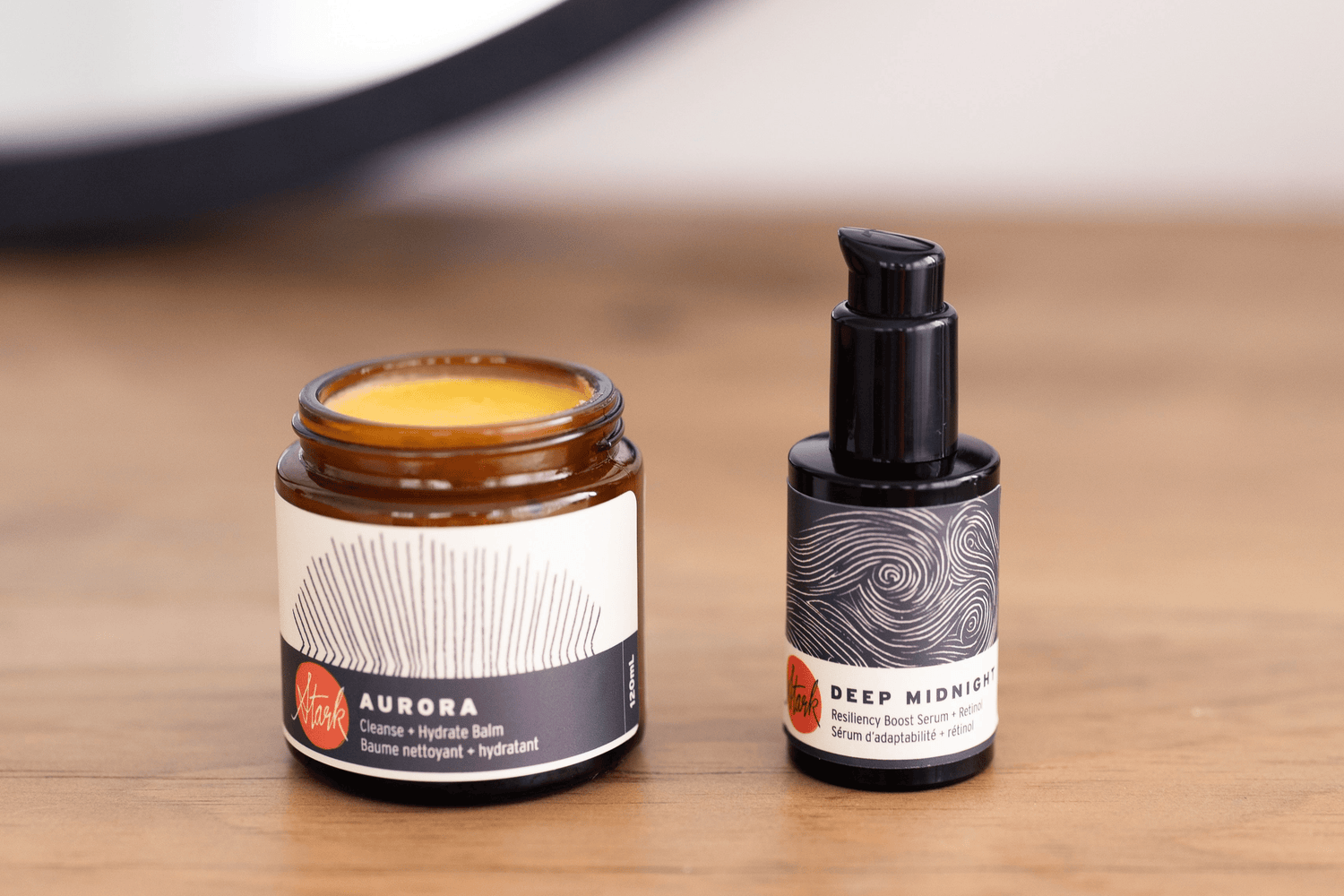
Artisanal Skincare vs White Label: Why Your Skin Deserves Better
Share
Sadly, artisanal skincare could be dying out as white label skincare products proliferate the market.
Look, I love artisanal skincare but we're up against all odds to survive in this crazy industry, and sometimes? I feel damn salty about it. So let me just use this energy and get into it. Grab your tea, because I'm about to spill my own. Or grab a cloth so I can clean up my mess? I don't know what this analogy is lol ANYWAYS.
White label products are a scam at both the consumer and brand level and I hate it. HATE IT. They saturate an already incredibly full market with promises of being a clever way to enter this industry with generic formulas that anybody can make their own through branding. But they are not a viable business option for most. They are a scourge to an industry I love. (Oh, and sorry about the kinda creepy AI image I used for this post! I'm getting a kick out of it, though. heh heh)
I'm so glad I got that off my chest!
Unless you're armpit-deep in the skincare world, you might not know what white label skincare is, but I can guarantee you've bought it before. There's probably some in your bathroom or bedroom right now (aahh, don't make eye contact!)
How and why? Because nearly every small skincare brand out there are using them, especially those weird ones that just pop up out of nowhere (so pesky), most Amazon brands or when random salons, pharmacies or tattoo shops suddenly have their own line of products. You can bet nobody there took the time to learn how to formulate a unique product and refine it over years to represent their brand. It's just a way to try to make a quick buck.
So what is white label skincare and why is "everyone" using them?
Well that's easy; it's because it's easy.
Private labs and suppliers offer white label products as the quick and cheap way to launch a skincare brand (everyone's doing it!), with dozens of ready-made bulk products ready to be branded with your very own name (oooh, how about Basil & Belinda Organics? Or Mr. Barnaby's Beard Barn? Or ooh, I know... CocoCleoNaturale!) Hopeful and established brands buy bulk product and repackage it. It's really not anything more complicated than that. Sometimes the formula can have a custom scent, colour or star ingredient to give it a unique selling proposition, for funsies.
A quick way to be ultra generic, slap that crap up on Amazon, take all the Marketing Courses you can because oh no this bland batter isn't selling, and crash out in 8 months. What could go wrong? It's a formula as predictable as the white label's.
The White Label Problem: Why Generic Doesn't Work
Here's what happens when you choose the easy route: You end up with products that hundreds of other "brands" are selling with different labels. Your "unique" vitamin C serum? Same formula as 47 other companies. Your "signature" moisturizer? Available from at least a dozen suppliers to anyone with a credit card.
The problems multiply quickly:
- Zero differentiation: You're competing on price and marketing alone because the product is identical to everyone else's
- No brand story: How do you explain your formulation philosophy when you didn't formulate anything?
- Quality control nightmares: You have no control over sourcing, production, or consistency
- Ingredient ignorance: You can't answer detailed questions about your own products because you didn't create them
- Ethical concerns: Customers think they're supporting a small business when they're really buying mass-produced products
Most white label brands fail within the first year because there's no substance behind the marketing. No expertise. No passion. No real understanding of skincare formulation or what makes products actually work.
Enter Artisanal Skincare: The Real Deal
Artisanal skincare represents everything white label isn't. It's the difference between a McDonald's burger and something crafted by a chef who actually knows what they're doing. It's the difference between fast fashion and a custom-tailored piece that fits perfectly.
True artisanal skincare means:
- Original formulations: Recipes developed from scratch based on specific skin needs and botanical knowledge
- Small-batch production: Quality control that's actually controllable because you're not mass-producing thousands of units
- Ingredient expertise: Deep knowledge of how each component works, where it's sourced, and why it's included
- Iterative refinement: Formulas that evolve and improve over time based on real-world results and feedback
- Authentic brand story: Products that actually represent the founder's knowledge, values, and skincare philosophy
When I started Stark in 2011, every formula began with understanding what skin actually needs to thrive in challenging environments. Not what was easy to source or already available from suppliers, but what would genuinely support skin resilience. That's how you end up with products like our Midnight oil with 13 carefully selected botanical ingredients that work synergistically, not because a lab had them pre-mixed, but because that specific combination supports skin barrier function better than any single ingredient alone.
How to Spot Artisanal Skincare vs White Label
The artisanal skincare brand can answer detailed questions about their formulations because they created them. They can explain why they chose specific extraction methods, why certain ingredients are included at particular concentrations, and how their products complement each other within a routine.
White label brands deflect or give generic answers because they don't actually know. They're essentially retailers selling someone else's formulations.
Red flags for white label products:
- Brands that launched with full product lines instead of growing organically
- Identical ingredient lists to other brands (seriously, google them)
- Vague formulation stories or "trade secret" explanations
- No mention of where or how products are made
- Founders with no skincare formulation background who suddenly have extensive product lines
- Products that seem too good to be true for the price point
Signs of genuine artisanal skincare:
- Detailed ingredient explanations and sourcing information
- Products that evolved over time rather than launching all at once
- Unique formulations you won't find elsewhere
- Founders who can discuss formulation challenges and choices in detail
- Consistent brand philosophy reflected in all product decisions
- Small batch production with attention to quality over quantity
The Artisanal Advantage: What Your Skin Actually Gets
Artisanal skincare isn't just about supporting small business (though that's nice too). It's about getting products that are actually formulated with intention and expertise.
When someone spends years learning botanical extraction methods, studying skin physiology, and refining formulations based on real results, you get products that work differently than generic alternatives. You get thoughtful ingredient combinations that consider how components interact, optimal pH levels for skin compatibility, and preservation systems that maintain product integrity without compromising skin health.
Take our Aurora cleansing balm. The specific ratio of kukui nut oil to mango butter isn't arbitrary—it's the result of testing dozens of combinations to find the perfect balance between effective cleansing and skin nourishment. The inclusion of bisabolol at exactly the right concentration provides anti-inflammatory benefits without interference from other actives. You can't get that level of intentionality from a white label catalog.
The Economics of Authenticity
Here's something the white label pushers don't tell you: artisanal skincare often delivers better value because you're paying for actual expertise and quality ingredients, not marketing budgets and middleman markups.
When you buy white label products, you're paying for:
- The supplier's profit margin
- The brand's marketing costs (often 40-60% of retail price)
- Generic formulations designed for maximum profitability, not efficacy
- Packaging and branding that masks the product's true origin
When you buy genuine artisanal skincare, you're paying for:
- High-quality ingredients chosen for specific skin benefits
- Formulation expertise developed over years of study and practice
- Small-batch quality control and attention to detail
- Products that actually represent the values and knowledge behind the brand
Why This Matters for Your Skin
Your skin isn't generic, so why would you use generic products? Artisanal skincare recognizes that effective skincare requires understanding how ingredients work together, how skin responds to different environmental challenges, and how to formulate for real-world conditions rather than laboratory ideals.
Skin is complex. It responds to seasonal changes, stress levels, hormonal fluctuations, and environmental factors. Products designed by someone who understands these complexities will always outperform products created by a lab to meet basic specifications and maximum profit margins.
The difference shows up in how your skin feels, how products layer together, how they perform in different climates, and how they support your skin's long-term health rather than just providing temporary improvements.
Supporting Real Innovation
When you choose artisanal skincare over white label alternatives, you're supporting actual innovation in the industry. You're funding research into new botanical extracts, better extraction methods, more effective formulation techniques, and deeper understanding of how skin health really works.
White label products don't innovate, they replicate what's already profitable. Artisanal formulators push the industry forward by exploring new possibilities, challenging conventional wisdom, and developing products that address real skin needs rather than manufactured market demands.
Every time someone chooses a thoughtfully formulated product over a generic alternative, they're voting for a skincare industry based on expertise and authenticity rather than marketing budgets and quick profits.
The Bottom Line
Artisanal skincare isn't just a marketing term, it's a fundamentally different approach to creating products that actually serve skin health rather than just filling market gaps.
Your skin deserves formulations created with intention, knowledge, and genuine care for results. It deserves products made by people who understand both the science and the art of skincare formulation. It deserves better than whatever generic formula happens to be available from the lowest bidder.
The next time you're considering a skincare purchase, ask yourself: Do I want products created by someone who spent years learning how to support skin health, or do I want rebranded generic formulas designed for maximum profit? Your skin will thank you for choosing wisely.
Choose expertise over convenience. Choose authenticity over marketing. Choose artisanal skincare over white label mediocrity.
Your skin and the future of the skincare industry depends on it.




